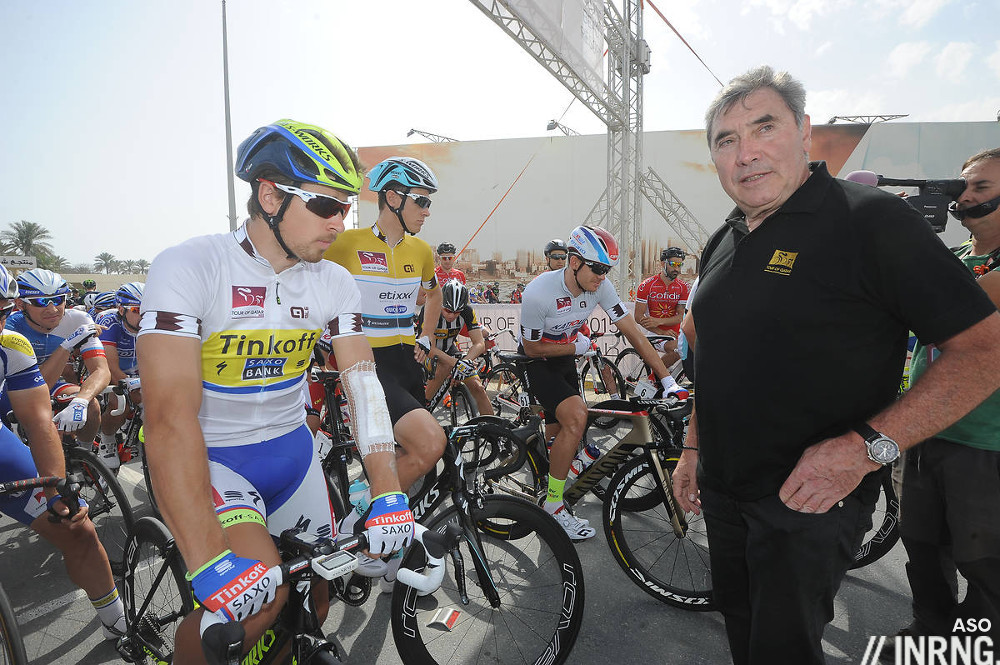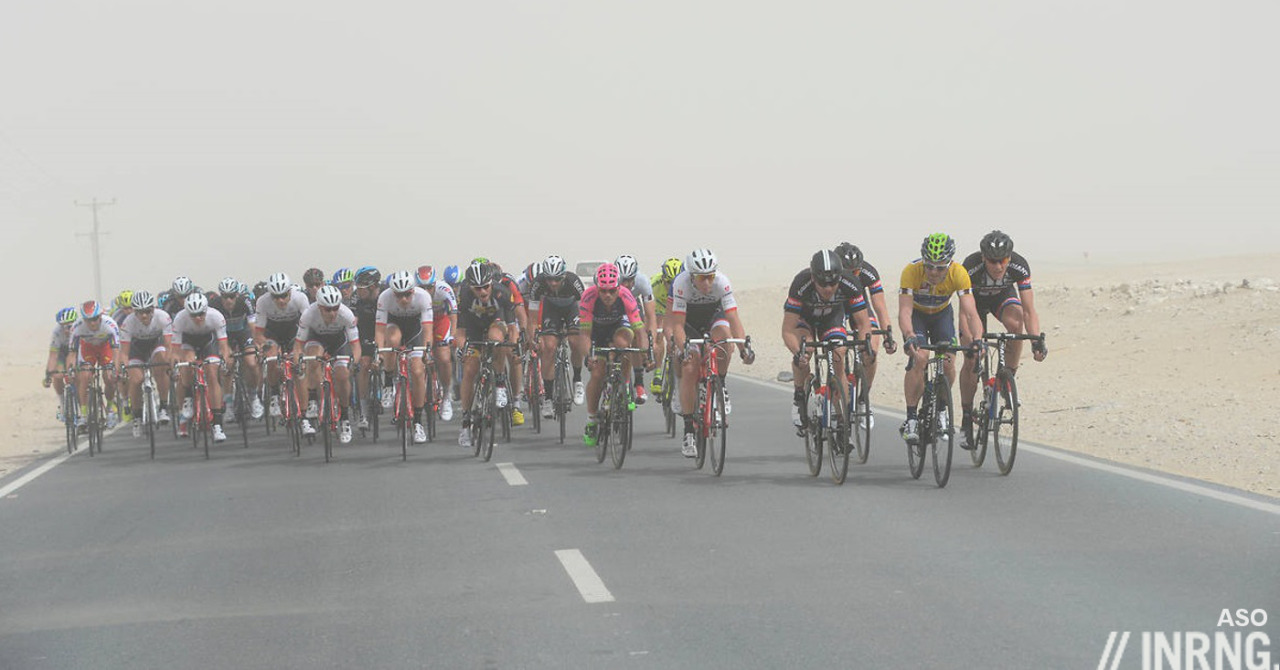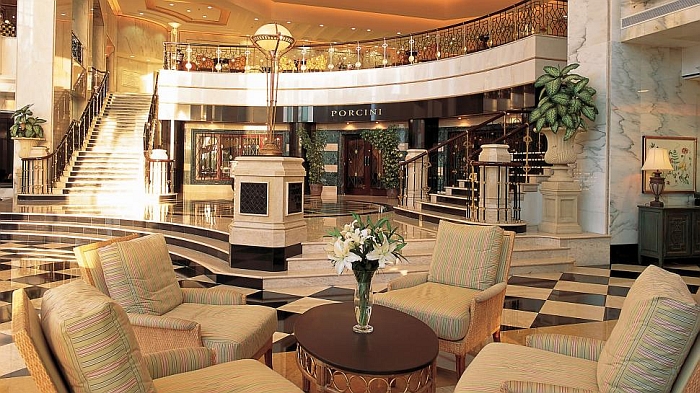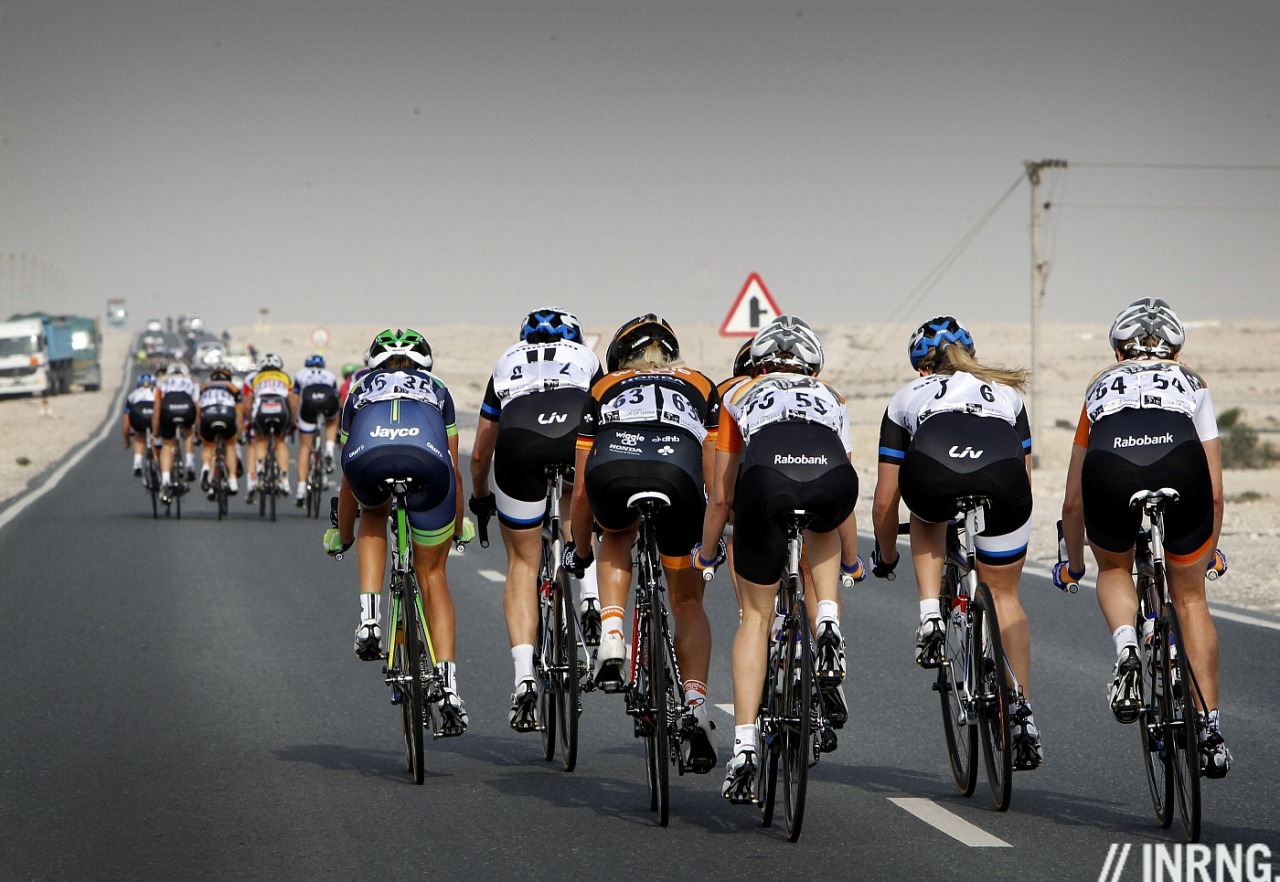The UCI announced today that the Tour of Qatar and the Ladies Tour of Qatar have been cancelled, a victim of their lack of success. This was the racer’s race, enjoyed by participants but it didn’t woo locals nor foreign audiences and now it’s run out of money. A UCI press release issued today cites “difficulty attracting sponsor financial support”.
The men’s race began in 2002 and a women’s race was added in 2009. Before all that Qatar wasn’t much until the oil and gas boom provided copious wealth, so much that it’s enjoyed the highest per capita GDP of any country on the planet. What to do with the money? They spent a lot turning Doha, turning a tiny port town into a metropolis albeit on the backs of imported workers from Bangladesh. This was “build it and they will come” but the construction was just the start and the city needed to be furnished with culture and status and it’s under this remit that the Tour of Qatar was conceived. Eddy Merckx and business associate Dirk De Pauw were hired to put on the race and they partnered with Tour de France owners ASO as the logistics grew.

The way to see the Tour of Qatar is not to treat it anything vital to cycling nor to Qatar. The race was only one entry in a diary full of imported sports events from tennis to ice hockey all designed to portray Qatar as a happening place and put the country on the map.
It’s been easy to mock the race for having more camels than spectators. Pro cycling seems to seek validation as much as it seeks sponsorship and the lack of crowds was a sad sight. Yet this was also part of the race’s curious attraction. This was racing redux, every superfluous item stripped away to leave just the riders, some roads and a finish line.

Less poetically the races will be missed by a sizeable proportion of the peloton who had their sights set on the spring classics. This was “sandbox racing”, the early season chance for pro teams to deploy their new sprint trains on wide roads before more complicated European streets. It was also a brutal test of fitness and commitment because on the exposed desert roads a light breeze was enough to act like a scimitar and slice the bunch to pieces. Hardcore fans may have enjoyed the echelon formations and salivated at the sight of competing sprint trains but this surely left the casual viewer bored rigid: an hour of TV with nothing save a group of cyclists riding through-and-off against a dusty backdrop, as if an endless animated GIF. This website offered previews but the vibe was often why you ought to be interested rather than a dish served up to an already salivating audience.

Even those on the receiving end of a hard day’s racing could enjoy the race as it was the first to host the peloton in the five star Ritz Carlton, an experience that remains a luxury and and rarity.
It’s embarrassing for the sport to lose an event that had just been bumped up to the UCI World Tour but the UCI doesn’t – and can’t – vet events too extensively; until now the race had a decent organisational record too. The event’s entry to the increasingly bloated World Tour meant attendance from the top teams wasn’t compulsory. As such the Tour of Qatar might have a premium label but it remained a secondary race and this status would have annoyed local sponsors who want to associate with the biggest and best. Also for all the wealth in Qatar there are limits and increasingly the Qatari authorities are having to be selective with their spending. The country went into recession last year too.
One lesson from cycling’s attempts at globalisation is that an event built up from a small start is better than an event created out of nowhere and dropped onto the calendar. Qatar was actually the former, it began in 2002 with a slow start and slowly grew but this isn’t enough. The format never stuck, the race felt as rootless as a Bedouin souk and if fans remember the echelons it’s hard to recall a precise moment or place from all the editions. The country’s wealth is below the ground rather than above it and its geography doesn’t offer much for a bike race. The desert has its charms but the race never highlighted them. Hopefully this isn’t the end of cycling in Qatar, they country remains ambitious about sport. Chloe Hosking wrote a nice piece about her experience with the Qatar women’s cycling team and now the chance of this happening again just got harder.


Seasons Greetings Inr, that I am the sole respondant seems to say more about your news than anything I might.
Respondent is spelled respondent.
That is the epitome of a troll comment.
I read it as a criticism of the ToQ as opposed to Mr. INRNG
A bit of a meh here. Having stayed at the campanile in Laval I can attest to the fact the riders will prefer 5* but as a spectator I couldn’t be bothered with these half-assed mostly untelevised races. The UCI need to learn from this, the tour of Beijing, the worlds and the Lampre fiasco that not every country that wants a race/team should be encouraged, even if they have a lot of cash.
I find it hard to believe that a gulf state rich in natural resources that can bid for and win the rights to stage the football world cup has “run out of money”.
Obviously Qatar hasn’t run out of money but the sources that made up the budget for the race would have been unwilling to continue given that the Worlds was lambasted and that the country won’t get the Olympics in light of the appalling reports of abuse of workers building FIFA World Cup stadia. The Tour of Qatar was one of several events hosted by the Qataris featuring Olympic disciplines with the sole aim of proving the country could host the Games. Now that the door appears to have been shut on that dream, why would sponsors and the state bankroll the event?
That and the races were a second tier competitions, why spend all this money to associate yourself with some unloved mediocre events? Last year’s event had problems with some teams that had enjoyed the race not attending too.
I still don’t buy it. A piffling cycle race must be a drop in the ocean to these guys. The bad PR and the mediocre image presented seem much more convincing reasons. It was always about image anyway. All these gulf sporting events are about “Look at us!”
This is a very late announcement, so close to the new season.
Is the appearance of a Bahrain team and the disappearance of this race a coincidence?
Would it have caused any jealousy / resentment / embarrassment?
Poor relations between the two countries…
Goodbye. Don’t slam the door on the way out Qatar.
I liked this race. I loved the echelons & all. Yeah, no spectators, but I’m not really watching the Tour for the big crowds either.
Agreed ave. We also need whatever we can get after the dark months. Loss of race days now extends to La Méditerranéenne where French police are incapable providing cover for more than two days (one plus TT) Surely not the last losses for 2017.
Agreed. Great warm-up/prologue for the spring classic narrative.
Shame to lose a race, but perhaps nice scenery is a part of attracting TV viewers which subsequently aids the growth of cycling.
Its just the nature of attracting sponsorship in the Gulf, you are reliant on interested individuals rather than a state/ corporate sponsorship, don’t be fooled into thinking otherwise, interested individuals under the guise of the state entity that ‘Employs’ them is the reason these events happen, and when they get bored with the new toy…well they move on, just look at the 2 new teams..
Bahrain – Merida – cycling prince
UAE – Abu Dhabi – keen cycling local
The big 3 sport sponsors from here Emirates, Qatar and Etihad Airways aren’t promoting sport, they just want people flying with them, transiting through the countries and spending money.
For some reason global businesses (apart from Sky) are not interested in cycling and we are left in the unfortunate position in relying upon interested individuals for the continued success of the sport
Because global businesses want to, obviously, back a global sport. If your sport is structured to appeal only to a tiny minority in Western Europe for a few months of the year then it won’t have the cachet to attract such corporate money. The deluded idea that cycling can persist with a sporting and business model that is essentially unchanged since 1974 yet still be seen as appealing to investors explains much of the current malaise the sport is going through. The only global brands that are willing to pony up are the bike manufactures (and another one just stepped up as OBE become Orica-Scott), but most of the others see alternatives to representing themselves to their actual and potential customers (ongoing doping stories probably don’t help but that’s another story).
What is also of note is that these two new World Tour teams both represent countries with (to my knowledge), no World Tour level riders. Even in the past when pro teams have emerged from newer cycling countries like the UK and Australia, there had been for years a vanguard of top riders from those countries who helped to build the sport up there through their achievements (Simpson/Boardman/Cavendish etc, and Anderson/McEwen/Evans and so on). Who are the great Middle Eastern cyclists who’ll generate local interest? Who will give those crowds by the roadside at these prestige events someone to cheer on?
Cycling lacks sponsors because of ongoing scandals.
You can still sell stuff to people in Western Europe/USA/Australia, so why would sponsors not do that and just pay less?
True, but what kind of stuff? INRNG has made a few posts about the frankly pissweak and low rent sponsors that back some of the major teams. Ordinary punters (who one assumes should be the target of sponsorship unless it’s one of those cases where the CEO is just a big cycling fan) often either can’t buy their products or services (Orica, CSC, Lampre etc) or they’re hyper-specialised like flooring (Quickstep) or Soudal (adhesives). Meanwhile your Red Bulls and Cokes or airlines are aspirational brands that have global appeal and application: almost everyone in the developed flies and enjoys caffeinated beverages in cans. To your point, Coca-Cola used to be a big sponsor of the TDF, but pulled the pin after the infamous 1998 debacle….
Pretty much everybody in the developed world has a floor too. That aside, in the original piece, while the UCI may not vet the WC races, why can’t they? It’s their World Tour, so why not require some guarantees from the promoters?
I’m quite sure (but I didn’t check) that Coca-Cola was sponsoring the TdF for at least 4-5 years after 1998…
Generally speaking, I’m very far from convinced that it’s all about the scandals.
I don’t think that, say, athletics has lived much worse years than the last ones, from a “scandals” POV, yet you can see, for example, how the sub-2-hrs. marathon challenge is moving big money and big sponsors.
Well, the major sponsors of Nordic skiing and biathlon are Viessmann (heating, industrial and refrigeration systems) and Hörmann (doors, doors and doors). Both sports are thriving, i.e. the money is bigger than ever for everyone.
gabriele, I’m not saying that other sports haven’t had doping scandals (nor am I saying that they haven’t ignored most of their doping problem), what I am saying is that the public perception – still – is that cyclists are all cheating (whereas they really believe that in other sports it’s just the odd ‘bad apple). To the general public, cycling is still ‘Lance Armstrong was cheating, but they all still do’.
@IanPa
Your analysis seems good.
I was involved in setting up the Abu Dhabi Investment Authority many moons ago and based on my memory of that alone, with no other up to date knowledge today, the criteria for investing state revenues were strict and objective. Thus I suppose that investment in a project through such a state agency may indicate a more stable, long term view. The state airways examples you give support this: they are proper commercial investments with cost benefits and paybacks. But, irrespective of who employs them, your view that in matters of small change payments into bike team sponsorships, the rich individual is key and likely to be fickle and un-lasting seems very likely.
The real point to pick up is Inrng’s reference to the UCI’s inability to vet its events closely. The Tour of Qatar has had a six year history -which is long enough to establish firm working relationships for the UCI- and presumably, as Inrng notes, it was a strategic investment through a state agency from the Qatari side, so the UCI should have had an easy contact point for ongoing dialogue and monitoring of the event’s prospects. Embarassing for the UCI indeed if this did not happen.
Actually Team Sky isn’t the global business model. Its the interested individual model. That individual being James Murdoch. If he wasn’t interested in cycling there never would have been a Team Sky. You can bet old Rupe doesn’t give a monkey’s that’s for sure.
With so few sponsors and race organizers, and more exiting every year, eventually professional bike racing might be a thing of the past. Maybe there will be virtual cycle racing instead, like PC on-line gaming, which is today a massive professional sport with multi-million EUR/USD prize money. We, who love cycle racing, and read this Inrng site with such passion, might be in the twilight of the sport. No sponsors, no money, no more races, no more heroes to look up to for junior racers with their demented energy taking up the sport, and, finally, no more cycle racing: it’s a chain reaction (pardon the pun).
Will the globalisation mavens now wake up to the facts? There was never any real interest in cycling in this part of the world.
Now, in Qatar, the novelty has worn off. How soon before the other countries of the region get bored?
The UCI should stop selling out the sport to despots in order to make a quick buck. It’s got nothing to do with spreading cycling interest worldwide – as anyone with even half a brain could always see.
As for the ethics of the regimes in charge – that should not be ignored.
It was still a whole world more interesting to watch than Dubai or Abu Dhabi, though.
“an hour of TV with nothing save a group of cyclists riding through-and-off against a dusty backdrop, as if an endless animated GIF. ”
What a great turn of phrase, just perfect!
What’s also incredible in this day and age is that the term ‘ladies’ is used instead of ‘women’.
Right. Maybe if gentlemen were being used as well, but between “Ladies” and podium girls and Sutton.
Damn straight. Irks me to no end.
I’ll have you know Qatar is quite progressive for the Middle East, they gave women the vote as early as 1999.
Why?
Because ‘women’ is neutral, whereas ‘ladies’ suggests that women should be behaving in some genteel fashion (or at the more extreme end of that thinking, not being ‘slags’).
Ergo, ‘ladies’ is a term that tells women what they should and should not be doing. Hence it’s considered sexist. As cd says above, fine if they were also calling it the ‘gentleman’s race’ – but we’d find that preposterous, wouldn’t we (imagining men in white slacks, stripey blazers and straw hats)?
Despite being handed WT status and the spill-over interest created (well, that’s what they claimed) by having the World’s in this gawdforsaken part of the world, Tour of Qatar is dead. Will the UCI learn anything from this failure or will they follow F1 and MotoGP in a short-term money grab while ignoring the very fans and countries that have traditionally supported pro cycling?
Not televised legally in UK for years so on the ‘give-a-crap-ometer’ it scored pretty low in a congested calendar. That said, had Eurosport shown it I’d have been recording while at work then tuning in later, rather than hunting around for iffy French youtube clips later on.
I don’t think the ToQ lacked success, or ran out of money. My baseless speculation is that the end-goal of the ToQ was the worlds. They achieved getting the worlds for Qatar and now they’re out.
Having lived in Qatar in the past I can say they don’t care for cycling in the slightest and, as with other events, just chased the UCI for the prestige of the event and the photos of people – famous, foreign people – doing things in Doha. Asian games, Diamond League, MotoGP, it’s all the same, whatever.
My above speculation that they played for the worlds and got them and now pull out assumes they thought things through – in Qatar they’ll happily spend millions without thinking anything through, and maybe that’s the case here. After the worlds they can see the pinnacle of the sport (that they can reasonably import) has attracted literally nothing for them apart from the same photos they got each year with the ToQ, so now they pull the pin.
Or maybe the one Sheik who was really interested in cycling has turned his interest to yachting. Or rock climbing. Whatever.
Any talk of sponsorship difficulty is most likely the UCI saving face after being told very shortly by Qatar “We’re out. It’s over.”